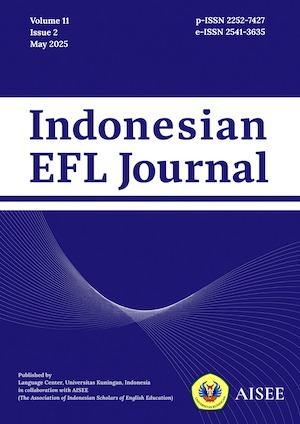REFUSAL STRATEGY PERFORMED BY INDONESIAN EFL LEARNER
Abstract
The research investigates the speech act recognition of refusing as made by Indonesian learners of English as a foreign language, native Indonesian, and native English. It involves three groups: 13 Indonesian EFL Learners (IELs), 13 Indonesian Native Speakers (INSs), and 13 American Native Speakers (NSs) of English. They were asked to respond to ten different situations, in which they carry out the speech act of refusal. Their strategies in refusing were compared one another in order to find out whether the refusal performed by Indonesian EFL Learner (IELs) correspond more closely with those of the Indonesian Native Speakers (INSs) or with speakers of the target language, the American Native Speakers (NSs). The data, collected from a Discourse Completion Test (DCT) which was developed by Blum-Kulka, were analyzed and categorized based on Azis’s categories (2000). Results indicated that although a similar range of refusal strategies were available to the two language groups, cross-cultural variation still exists. The data involved some contextual variables, which include the status of interlocutors (higher, equal, or lower status) and eliciting acts, i.e., requests, invitations, offers, and suggestions.
Keywords: Indonesian EFL Learners; interlanguage pragmatics; refusal strategy; speech act.References
Azis. (2000). Refusing in Indonesian: Strategies and politeness implications. Unpublished PhD Thesis Departement of Linguistics, Monash University.
Bardovi-Harlig, K. (2001). Evaluating the empirical evidence: Grounds for instruction in pragmatics? In K. R. Rose and G. Kasper (Eds.), Pragmatics in language teaching (pp. 13-32). New York: Cambridge University Press.
Beebe, L., Takahashi, T., & Uliss-Weltz, R. (1990). Pragmatic transfer in ESL refusals. In R. Scarcella, E. Andersen, & S. D. Krashen (Eds.), The development of communicative competence in a second language (pp. 55-73). New York: Newbury House.
Blum-Kulka, S., & Olshtain, E. (1986). Too many words: Length of utterance and pragmatic failure. Studies in Second Language Acquisition, 8, 165-179.
Brown, P., & Levinson, S. (1987). Politeness: Some universals in language usage. Cambridge: Cambridge University Press.
Chen, H. J. (1996). Cross-cultural comparison of English and Chinese metapragmatics in refusal. Indiana University. (ERIC Document Reproduction Service No. ED 408860).
Franch, P. B. (1998). On pragmatic transfer. Studies in English Language and Linguistics, 5-20.
Holmes, J. (2001). An introduction to sociolinguistics. London: Longman.
Honglin, L. (2007). A Comparative study of refusal speech acts in Chinese and American English. Canadian Social Science, 3(4).
Linde, A. (2009). How polite can you get?: A comparative analysis of interlanguage pragmatic knowledge in Spanish and Moroccan EFL university students. Universidad de Granada. Porta Linguarium, 12, 133-147.
Peccei, J. S. (1999). Pragmatics. London and New York: Routledge.
Thomas, J. (1995). Meaning in interaction. New York: Longman.









